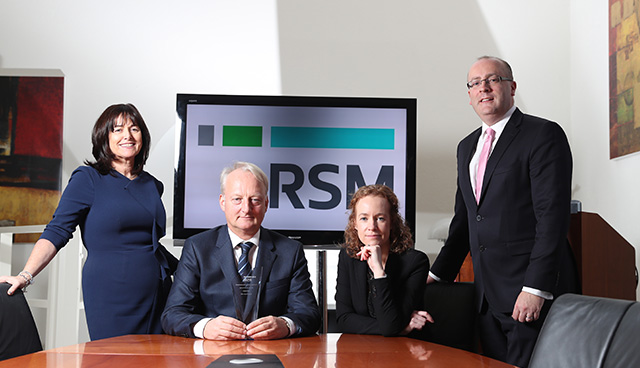Citizen-centred public services
 Abtran CEO Michael Fitzgerald outlines how Ireland can move towards achieving a global leadership position in the provision of government services.
Abtran CEO Michael Fitzgerald outlines how Ireland can move towards achieving a global leadership position in the provision of government services.
How public services are provided to citizens is changing as citizens’ power increases and people look to engage with all service providers in the way that best suits them. Digital has changed expectations with citizens looking for more control and faster access to all services – including public services. Governments, in Ireland and internationally, are looking to achieve improved services levels at lower cost of delivery.
Easy access and a better experience are expected by the customer, the general public. Delivering this improved experience is an imperative for the public sector while also achieving a better return on investment for government and better value for money for the taxpayer.
Change is happening. A range of initiatives have been implemented by the Department of Public Expenditure and Reform. The Government Chief Information Officer has been appointed. A public sector recruitment moratorium is in place. A range of service delivery models are operational which demonstrate effective collaboration between the public and private sector.
The Revenue Commissioners is recognised as a service leader internationally – making compliance easy with ROS and recently achieving 90 per cent compliance with the local property tax.
Empowerment
Experience and best practice across the public and private sectors demonstrate that both increased compliance and customer satisfaction can be achieved when more ownership is given to the public.
This empowerment comes with responsibility to ensure that all information is provided and that the information is correct when completing a grant application, filing a tax return or booking an airline ticket. This approach needs to be become more evident in the delivery of public services if cost and service improvements are to be achieved.
Collaborative approaches – leveraging the best of the public and private sectors as well as academia – have the potential to transform public services. This kind of change takes time, a willingness to take risks and to try new ways of delivering services.
A range of service principles agreed by all stakeholders will help to ensure that the challenge of ‘better services for less’ will be addressed successfully.
Build once and use often is a core principle applicable across all service delivery models. Once excellence is achieved in an area of service, we should look to utilise that expertise and experience across multiple areas. This applies to future-proofing large capital investments as well as ensuring that we are making the most of the people, processes and technologies already in place.
 Key stakeholders are putting this principle into practice more and more. For example, the Government recognises the validity of this principle when looking to extend the remit of the Revenue Commissioners where appropriate. Transferable, interoperable service processes will reduce risk, cost-to-serve and time taken to roll out changes which enhance the citizen experience.
Key stakeholders are putting this principle into practice more and more. For example, the Government recognises the validity of this principle when looking to extend the remit of the Revenue Commissioners where appropriate. Transferable, interoperable service processes will reduce risk, cost-to-serve and time taken to roll out changes which enhance the citizen experience.
Utilising data analytics to develop a better understanding of the ‘single citizen’ or ‘common customer’. These citizens exist across multiple databases with multiple identities so this improved understanding will result in better services and will radically reduce costs.
In recent years, Abtran has seen greater collaboration and data-sharing between public service departments. This serves to improve overall efficiency levels as well as delivering a superior service to the citizen.
Digital engagement is already playing a key role in the delivery of Government services. In the UK, the Government Digital Service (GDS) looks set to become an example of best practice in terms of efficiently handling high-volume transactional services online. Digital facilitates efficient communication with citizens and enables quick and frequent feedback from the public. This presents challenges and opportunities.
Government information and service delivery to Irish citizens have predominantly been via traditional websites. In harnessing new technologies to better serve the nation into the future, strategies will have to take into account mobile and social.
Implementing governance structures with a clear purpose and objectives will ensure that accountability is achieved by transparent measurement of costs and the service experience. Metrics and performance can then be benchmarked with national and international best practice.
The primary focus is on ‘who?’ The citizen’s experience is kept at the centre of all decisions – and then ‘how?’ and ‘what?’ is needed to achieve stated objectives and target return on investment. Different service models – insourcing, outsourcing and shared services – can then be designed, based on the optimal fit.
Ireland was recently described by Forbes as the best country globally in which to do business. The Revenue Commissioners is recognised as a leader internationally and number one in the delivery of online self-service in Europe. We believe Ireland will achieve a leadership position globally in the delivery of government services.
About Abtran
We are a leading business process provider delivering services within compliant regulated markets across the Public Sector, Utilities (water, gas and electricity) and Financial Services. We provide a range of services to our clients incorporating service delivery on an insourced basis which are fully embedded within our client operations or on a fully outsourced basis. We are specialists in the delivery of identity and entitlement services (licensing, registrations, grants and claims), health administration, customer management and electronic toiling services.
 Get in touch for more information on Abtran’s services.
Get in touch for more information on Abtran’s services.
Tel: +353 (0)21 230 1800
Web: www.abtran.com
Twitter: @AbtranGlobal





